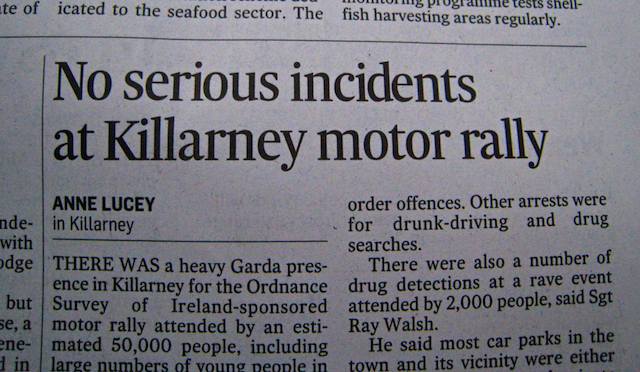The guy who founded monster.com has had another idea — an online obituary site. He’s noticed that the baby-boomer generation is heading for what a Telegraph marketing consultant once described as “biological leakage”. Lots of ad opportunities too — for example for undertakers. I am reminded of the advice in that admirable book, Die Broke: the last cheque you write should be to the undertaker — and it should bounce!
Monthly Archives: May 2008
Samsung 500GB laptop drive spotted — in France
From Engadget.
We’ve been wondering where Samsung’s 9.5mm 500GB SpinPoint M6 laptop drive has been hiding, and it turns out that it’s just been vacationing in France. No word on when these might make it Stateside, but if you’re desperate (or French), your lappy can unbuckle that belt another notch or two for just €197 ($306).
Hmmm…I could use one of those in my MacBook Pro…
Bite-sized post
Rory Cellan-Jones’s dog ate his Financial Times. Good doggie, nice doggie.
Highway robb… er, Grand Theft
Wow! This from today’s New York Times
SAN FRANCISCO — Grand Theft Auto IV, the latest iteration of the hit video game franchise, racked up first-week sales of $500 million, Take-Two Interactive, the game’s publisher, plans to announce on Wednesday. The report exceeded the sales expectations of analysts.
The company is expected to report it sold six million copies of the graphically violent game, 3.6 million of them on the first day.
The sales exceed projections of industry analysts who were estimating that some five million consumers would purchase the game in the first two weeks….
Rather puts the movie business in perspective, don’t you think?
Three down, next one up

Bertie Ahern, the Irish Taoiseach (Prime Minister to you), tendered his resignation to the President at 6.10pm yesterday. Today Brian Cowen, his multi-chinned successor as leader of Fianna Fail, will be elected Taoiseach when the Dail (Parliament) meets.
Interesting Fact #1: Fianna Fail is the political wing of the Irish construction industry.
Interesting Fact #2: Cowen’s last three predecessors as Fianna Fail leader have had to resign because of, er, difficulties over money. Charlie Haughey went because evidence of his deep-seated corruption became too widespread to be ignored. His successor Albert Reynolds went because a public inquiry into subsidies to beef exporters had unearthed unsavoury details about his time as Minister of Commerce. And Bertie Ahearn walked because the evidence to the Moriarty Tribunal about his astonishing personal finances was making the normal business of government impossible.
It will be interesting to see if Mr Cowen can break this impressive mould.
On this day…

… in 1945, Germany signed an unconditional surrender at Allied headquarters in Reims to take effect the following day, ending the conflict in Europe.
No going back
Martin Weller has a thoughtful post about the technophobic argument that Twitter/FaceBook/CloudComputing/Web2.0/Blogging (delete as appropriate) is just a passing fad. (I hear this all the time from people who seem to hold me personally responsible for whatever technological craze is currently annoying them.)
Martin writes:
Even if it doesn’t turn out as some enthusiasts predict there is one key point that the detractors always miss – it will never go back to how it was. After wikipedia, Flickr, YouTube, iTunes, etc the idea that consumers of newspapers, books, music, television, and yes, education, will realise it was all just a silly mistake and go back to how it was may be what the industry leaders dream of, but is unlikely, to say the least.
Which brings me on to my even if we’re wrong, we’re right argument. Sure things won’t be the utopian vision of free services, open education and democratisation that some talk of, but whatever comes after the current trends will build on top of them. Just as web 2.0 built on what had happened in the first wave of web development. And the people who got it, the founders and the visionaries weren’t people who had dismissed the web and insisted it would go away. They were people who engaged with it, and could see how to take it forward. So, whatever comes after web 2.0 (don’t say web 3.0), the people best placed to understand it and adapt to it will be those who have immersed themselves in the current technological climate, and not those who have sat waiting for it to fail so they can say ‘told you so.’
In my experience, by the way, a good way of discomfiting people who decry the Web is to ask whether they use RyanAir or EasyJet. The majority have, and these are so-called ‘ticketless’ airlines. The point being, of course, that even those who regard the Web as a passing fad are totally reliant on it for cheap air travel!
UK News Media: a hyper-critical view
Hooray! Nick Davies is coming to Cambridge to talk about his book. Lovers of the British tabloids form an orderly queue. May 19 at 8pm. Venue: Wolfson College. All welcome!
‘Small earthquake’ lives on
In his wonderful memoirs Claud Cockburn, tells of his early days on the Times and of a competition that sub-editors ran to see who could come up with the most boring headline. The winner was “Small earthquake in Chile — not many dead.” This clipping from yesterday’s Irish Times shows that the art form is not yet dead.

I knew Claud and his wife Patricia towards the end of his life. They were amazingly kind and hospitable to me when I was a callow undergraduate in Cork. (They lived, in a wonderful kind of rackety splendour, outside Youghal.) When I confided to him that I was thinking of going in for journalism he said: “Just one piece of advice, dear boy: make sure you libel someone famous early in your career!“
Why J.K. Rowling is a hog
Christopher Caldwell wrote a great FT column about J.K. Rowling’s legal action to resist fair use of her work. Excerpt:
The gravamen of Ms Rowling’s and Warner Brothers’ argument is clear. Mr Vander Ark’s book “is not a reference book or scholarly critique”, they claim, and it lacks “any originality or invention”. Ms Rowling has praised Mr Vander Ark’s website, but calls the book that will draw from it “wholesale theft”. Her attorneys note that “Ms Rowling has allowed fans and scholars wide latitude to comment on, critique, and even create ‘fan fiction’ and art based on her stories”. But of course, nobody in a free country requires authors’ permission to comment on or critique their work.
Lawyers at Stanford University Law School’s Fair Use Project, who are defending Mr Vander Ark pro bono, sought to show in three days of testimony this week that the Lexicon constitutes “fair use” of Ms Rowling’s work. It is a reference guide, of the sort that is familiar (and indispensable) to anyone who has taken a deeper interest in Balzac, Proust, Faulkner or Star Trek.
Ms Rowling “appears to claim a monopoly on the right to publish literary reference guides and other non-academic research relating to her own fiction”, according to Mr Vander Ark’s lawyer. Joe Nocera, The New York Times business writer, puts it even more bluntly. He has called Ms Rowling a “copyright hog”.
Whether the lexicon violates “fair use” depends, according to US legal experts, on whether it is “transformative” or whether it just cribs from Ms Rowling’s plot and prose. Much of the testimony missed this issue.
Ms Rowling dwelt on her own plans to publish a Potter encyclopaedia, which is neither here nor there. Literary critics cannot be kept from writing about, let us say, the novels of Philip Roth on the grounds that Mr Roth swears he wants to publish a book called What My Novels Mean. The fact that Mr Vander Ark would profit from his lexicon is a red herring, too. Provided he is within the boundaries of “fair use”, there is nothing illegitimate about his profiting from his work, any more than it is illegitimate that book reviewers be paid if they cite the books they review.
Ms Rowling also demeaned the quality of Mr Vander Ark’s book, which is legally irrelevant. Apparently some puns she was particularly proud of, including a “double allusion” in the name Remus Lupin, went over his head. She came off as condescending (“It’s very difficult for someone who is not a writer to understand”), self-involved (the suit, she said, “has really decimated the demands of my creative work for the last month”) and mean.
Good, robust piece. Right on.
